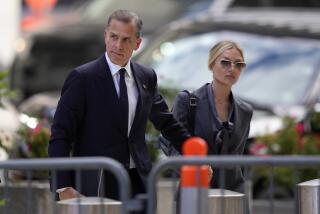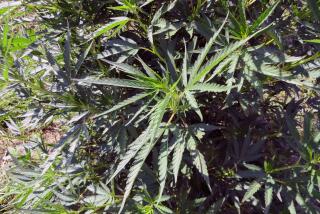Bonds’ at-bat in court begins
- Share via
SAN FRANCISCO — Home run king Barry Bonds steps into an unfamiliar arena today when he is expected to enter a packed courtroom to answer perjury and obstruction of justice charges that could send the slugger from baseball stardom to federal prison.
Not facing trial but sharing the unwelcome glare of public attention will be a stubbornly silent friend of the baseball legend who could yet emerge as a star of future legal proceedings -- a potential witness viewed by many as central to allegations that Bonds lied to a grand jury when he denied knowingly using steroids.
Greg Anderson, Bonds’ longtime friend, physical trainer and a convicted steroids distributor, already has served more than a year behind bars for refusing to answer grand jury questions in a government steroids investigation. Through his attorney, he has vowed to stay silent.
Anderson also has served a separate three-month prison sentence for money laundering and distributing steroids, punishment that his lawyer now argues should have satisfied the government and should allow the trainer to get on with his life.
Anderson’s apparent loyalty to the 43-year-old baseball star and his willingness to endure incarceration may have added to his value as a prosecution witness.
“I think he would be a much more powerful witness because he has been in jail for more than a year,” said Golden Gate University law professor Peter Keane. “His credibility would be enormously enhanced.”
Lawyers familiar with the case expect the government to make another stab at extracting testimony from Anderson, who as a boy played on San Francisco Peninsula baseball diamonds as did the young Bonds and who as a man became a fixture in the Giants’ locker room.
Anderson’s Los Angeles attorney, Mark Geragos, said he would not be surprised if government prosecutors called the 41-year-old trainer, because without him “they have little or nothing” to make their case against Bonds.
Although the government has said that it accumulated a mountain of evidence, Anderson’s testimony was considered so important to the federal case that prosecutors delayed Bonds’ indictment in hopes that the trainer would tire of prison and tell all he knew about the alleged use of performance-enhancing drugs by the Giants outfielder, who is now a free agent.
Former U.S. Atty. Kevin Ryan, who supervised the government’s initial investigation into athletes linked to steroids and the Bay Area Laboratory Co-Operative (BALCO), said the government might well continue efforts to compel the testimony of Anderson.
“The government has made the statement that they could get a conviction without his testimony, but that does not mean they are not going to try” to obtain it, said Ryan, adding that Anderson could face more prison time if he again failed to testify.
“He is not out of the woods yet,” Ryan said.
Several of the alleged acts of perjury involve questions about Anderson, such as whether the trainer ever gave Bonds steroids and whether the player took them. “The government’s toughest job is to prove to the jury what Bonds knew,” said Sacramento criminal defense lawyer William Portanova, a former federal prosecutor who believes Anderson will be called.
Two ways to prove that Bonds knowingly used steroids, Portanova said, are to get him to admit it or to get testimony from people who say that Bonds told them that he did.
But the witnesses’ credibility still becomes fair game for defense attorneys -- and at least two potential witnesses against Bonds arguably have axes to grind.
Bonds’ former longtime girlfriend, Kimberly Bell, has said that Bonds once told her that he was taking steroids and that his body changed in ways consistent with the side effects of steroid use. But lawyers say the defense could attack Bell as a jilted, disgruntled, publicity-seeking former lover who posed for Playboy.
The attorney for Steve Hoskins, who was a boyhood friend of Bonds and is the son of a former San Francisco 49er football player, has said that Hoskins has unspecified knowledge of Bonds’ steroid use and that Hoskins had urged him to stop.
The attorney has said that FBI agents interviewed Hoskins about steroids after Bonds made an unsustained allegation that Hoskins, who did memorabilia business with the ballplayer, had cheated him.
“Steve Hoskins was Barry Bonds’ very good friend and still on certain levels cares about Barry,” attorney Michael Cardoza said. “If called to testify, he . . . will tell the truth. It’s like he lost a good friend, and if you are no longer friends, it is like ‘I hope nothing bad happens, but you brought it on yourself.’ ”
Lawyers say that some former teammates who allegedly received substances from Anderson might be called to testify. But if the trial proceeds without a plea deal, voluminous testimony is expected about evidence seized from Anderson’s home and from the BALCO lab started by Victor Conte, a musician-turned-sports-nutrition guru who pleaded guilty to money laundering and steroids distribution.
Legal experts also say that there probably will be medical witnesses who will testify about whether Bonds could have achieved his muscular stature without chemical help, as well as linguistic experts who will debate the precise meaning of the questions and answers in the perjury counts. Additionally, they say, there probably will be scrutiny of the federal investigators.
But there is no question among many familiar with the case that Anderson, the intermediary between BALCO and Bonds, could have information bearing on the truth of the allegations.
Growing up on the Peninsula, Anderson loved baseball and knew Bonds, who was a couple of years older and already showing the makings of stardom.
Anderson was reported to have met Bonds through the family of Roy McKercher, a sheriff’s deputy whose sons were avid ballplayers. McKercher recently recalled Anderson as a good, hard-working young man who later showed great kindness to McKercher’s terminally ill wife.
Anderson’s baseball career included stints on college teams, but despite some success, he did not have pro-level talent.
Along the way, he had begun weight training, however, and when he returned to the Peninsula, he reconnected with baseball buddies and hung out at a gym near BALCO in Burlingame. He became a trainer.
Anderson was teaching young ballplayers to become stronger and quicker, and he sometimes did group fitness sessions for women.
“Greg was a super guy that had a child, and his big concern was his family,” said Ken Lockwood, a real estate salesman and former judo coach who used the gym. “He was well-groomed and was very professional. He did not have a flock of world-class athletes -- he had one guy, a friend.” That was Bonds, and they were all business during workouts.
Several years ago, Anderson asked Lockwood about BALCO’s testing program for trace minerals. Anderson, he said, was looking for an introduction, not for steroids, and was advised to knock on the door of the nearby lab. He later told Lockwood that he was impressed with the program.
“Greg . . . first brought Barry into BALCO shortly after the end of the 2000 baseball season,” said Conte, who says that he thought their friendship was based on strong mutual loyalty.
Bodybuilder Emeric Delczeg, who frequented BALCO, said he later helped Bonds pose for a photo shoot for Conte’s business. “I was really surprised that his muscles were not bigger than anyone can achieve eating and working out,” he said. “For that physique, you do not need steroids.”
The San Mateo County Narcotics Task Force heard from informants that Anderson was selling steroids.
“We tried to get one of our undercover agents to make a buy from him, but we were unable to do it,” then-Sheriff Don Horsley said. “But they were bodybuilder types, and he was interested in more higher-profile people. . . .” By 2002, the task force had teamed with the Internal Revenue Service, which was conducting its own investigation of BALCO. And in 2003, officers served search warrants on the laboratory and Anderson’s home.
Lawyers say that if Anderson is offered immunity, he could be ordered to testify against Bonds and could be jailed for the duration of the trial for refusing to do so. Additionally, they said, the government could seek separate criminal contempt charges against him.
But Geragos continues to insist that Anderson will maintain his silence, because he believes that Anderson will never be called to testify for the government after pleading guilty to steroid-related charges and serving prison time in 2005.
“He is not going to testify,” Geragos said. “They can try, but the fact is he’s already shown that he can’t be coerced by the threat of jail time.”
As a result, he said, “there is no basis” for a judge to conclude that further jail time will make him testify.
lance.pugmire@latimes.com
More to Read
Are you a true-blue fan?
Get our Dodgers Dugout newsletter for insights, news and much more.
You may occasionally receive promotional content from the Los Angeles Times.










